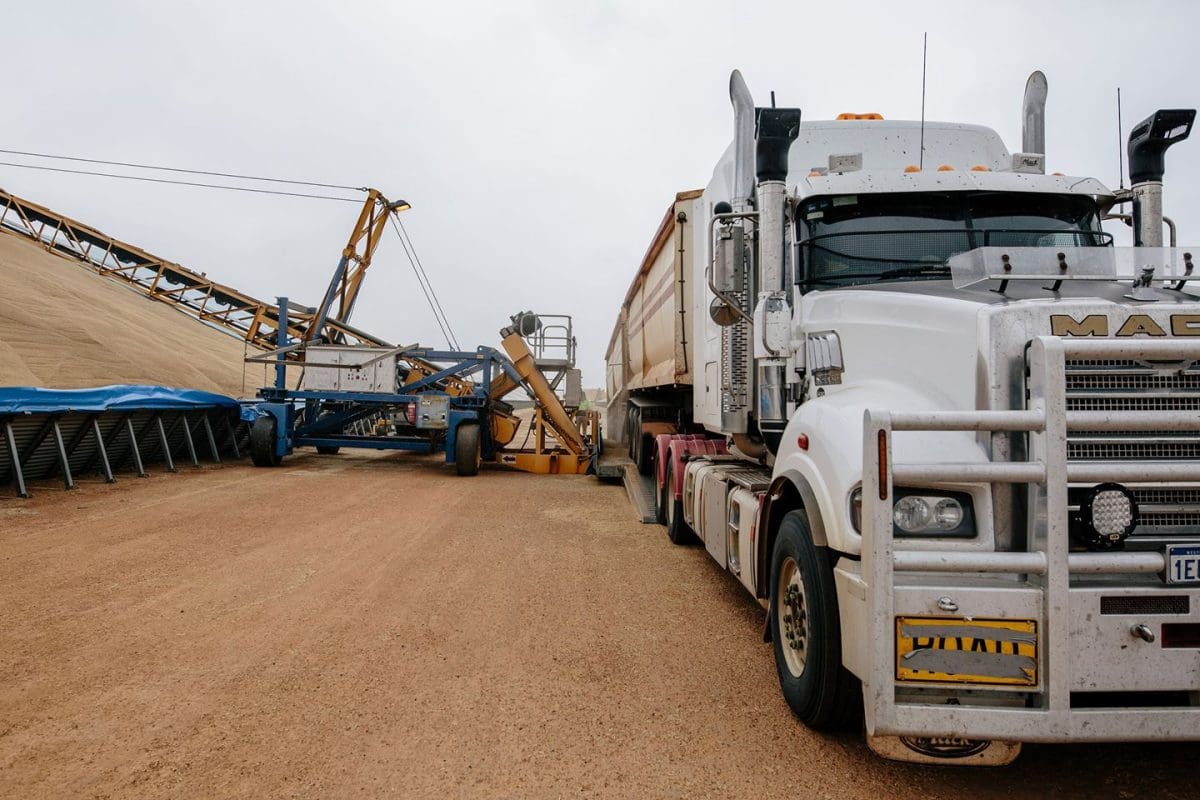
Rain last week reduced volumes delivered to WA’s major bulk handler. Photo: CBH Group
SEVERAL rainfall events have slowed the rate of harvest deliveries to Western Australian bulk handler CBH Group, with the company receiving 1.4 million tonnes (Mt) in the week ending November 20.
This brings the total deliveries to 3.9Mt, compared with 4.7Mt received this time last year.
CBH Group chief operations officer Mick Daw said rainfall events throughout most of the state over the past week had halted harvest in some areas.
“We have again had considerable rainfall across most of the state, with some areas throughout the central wheatbelt also reporting hail and loss of crop,” Mr Daw said.
“Despite this slow and frustrating start to the harvest period for both growers and our operations team, some of our sites have still managed to break daily receival records.
“Some growers are still reporting yields higher than expected, and protein in the northern part of the state is also higher than expected at this stage, which is a fantastic result.
“We do, however, anticipate that this will place some pressure on some sites and services across the network, with some sites expected to fill and close.
“We are currently monitoring this and working through how this is managed, but we are encouraging those growers that can deliver direct to port to do so.”

Albany Zone
The start to harvest has been slow, with growers battling high moisture levels and rain events across various parts of the zone.
The total grain received is 255,000t, the majority being canola, with some barley and oats starting to be delivered.
The quality of canola has been good.
The Lake Grace and Jerramungup areas have had the most receivals to date.
Hyden broke its daily receival record twice in consecutive days with 60 per cent of the grain received on those days being canola.
All areas in the zone now have sites which are open with the average cycle time sitting at 41.7 minutes.
Esperance Zone
Wet weather impacted the zone again last week, with falls of 6-35 millimetres across the region.
Harvest progress has been slow due to high-moisture issues and rainfall, but towards the end of the week, there was a steady increase in receivals.
More rain is expected over the next few days, with some fine weather finally arriving next week; CBH anticipates harvest receivals to increase significantly.
Dominant commodities are still canola and barley, with volumes of malting barley slowly increasing.
Wheat is still very slow, which is to be expected.
The average cycle time is 55.5 minutes across the network.
Geraldton Zone
Warm weather has helped increase the pace of harvest, with wheat deliveries picking up last week, but a wet end to the week slowing things down again.
All sites in the zone are now open.
The Binnu and Northampton sites both broke daily receival records with 6232t and 7984t respectively.
This mix of commodities received is 35pc canola, 48pc wheat, 11pc lupins, and 0.5pc feed barley.
Yields and quality are still above expectations.
Kwinana North Zone
With a weeks’ worth of good harvesting conditions, Kwinana North Zone has seen receivals pick up.
Merredin and Koorda have both broken their daily receival records, receiving 16,761t and 10,535t respectively.
The zone is now receiving all commodities, and grain quality has been good, with yields higher than expected in some areas.
The majority of sites are open throughout each area, with the average zone cycle time sitting at 41.5 minutes.
Kwinana South Zone
Harvest receivals have ramped up over the past seven days, but wet weather continues to impact harvesting across the zone, with most growers losing on average two days of harvesting last week.
Only 11pc of the expected volumes for Kwinana South have been received so far.
This time last year the zone had received about 19pc, indicating it will be a bigger, slower, and longer harvest.
Growers are mostly still delivering canola, but a few have signalled they will be ending their canola harvest this week.
Wheat and barley volumes are ramping up, but these are still at least six weeks away from peaking.
Deliveries of oats and lupins are slow but steady.
Canola and wheat quality has been good overall.
A number of Kwinana South sites have reduced operating hours due to wet weather across the zone, with cycle times up slightly from last year.
Source: CBH Group

Ravensthorpe District has had rain. RPOs waiting at sites, some only getting 15 hours work for 7 days so probably not the best job as people come from Perth, and also backpackers from overseas that are told they will be working 6-12 hour days than 1 day off but they are not told if it rains they don’t work. Mick Daw didn’t mention that.